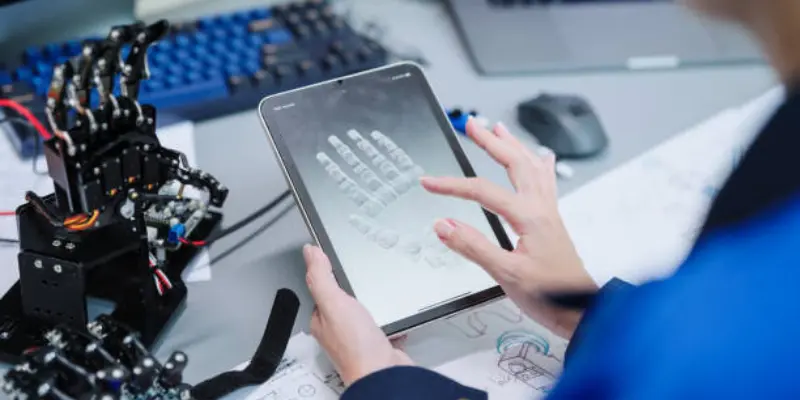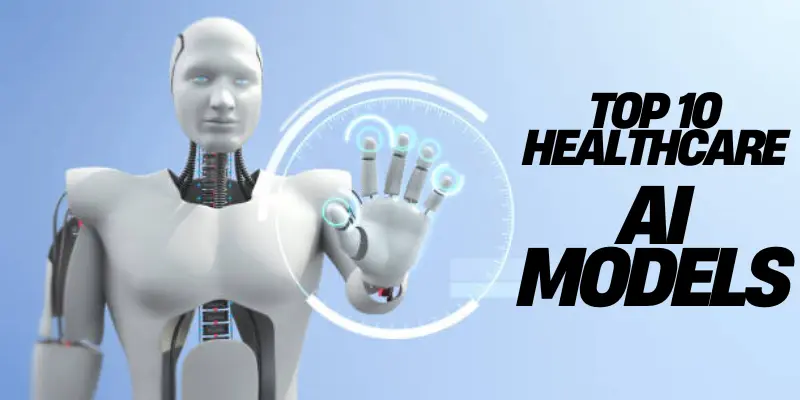Healthcare AI Models: What Factors Make Them Useful? Top 10 Healthcare AI Models Overview
Published: 14 Apr 2025
Have you ever wondered how hospitals make faster decisions today than they did years ago? The secret is Artificial Intelligence (AI). AI helps doctors and nurses to do their jobs better. AI models are special tools that use this technology to solve health problems.
In this blog, we’ll walk you through the explanations of the words ‘Healthcare AI Models’ and also look at ‘10 amazing AI models’ that are changing healthcare. Don’t worry—we’ll keep it super simple.
Whether you are a tech lover, a student, healthcare provider or just curious, this post is for you. Let’s dive in and explore the future of AI models in healthcare together!

What is a Healthcare AI Model
Healthcare AI models are smart computer programs which are trained to solve medical problems. They learn from patient data like lab results, X-rays and doctor notes. These models help doctors to make informed decisions, spot diseases early and suggest the best treatments. They are built to support healthcare teams and improve patient care.
- They learn from data such as test results, images and records.
- Their job is to help with tasks like spotting illness, planning treatment or reading scans.
- Doctors use them to save time, avoid mistakes and treat patients better.
What Makes an AI Model Useful in Healthcare?
Not every AI model is helpful in a hospital. The good ones share a few important traits. Let’s look at what makes them stand out.
✅ 1. Accuracy
The model should give correct results. In healthcare, even a small mistake can affect someone’s life. A good model helps doctors in making better choices.
✅ 2. Speed
Time matters a lot. AI models should work fast whether they are reading an X-ray or spotting a stroke. Quick results mean quicker care.
✅ 3. Easy to Use
Doctors and nurses don’t have time to learn complex tools. A helpful AI model fits right into their daily work.
✅ 4. Safe for Patients
AI models process huge amounts of patient data which raise privacy concerns. Good AI models protect patient data and follow safety rules. Privacy is very important in healthcare.
🏥 Real-Life Example
Imagine a hospital emergency room. A patient comes in with chest pain.
An AI model quickly scans their chest X-ray and alerts the doctor: “Possible signs of pneumonia.”
That fast, helpful warning can make all the difference.
Top 10 AI Models in Healthcare
Here are ten powerful AI models that are changing how doctors care for patients. Each one solves a different problem but all help make healthcare smarter, faster and safer.

In this section we will explore a short overview of each AI model, for complete detail about these AI models it is suggested to read AI companies in Healthcare which explains each in complete detail.
1. IBM Watson Health
What it does: Helps doctors choose better cancer treatments.
Where it’s used: In hospitals and cancer care centers.
Example: A doctor types in a patient’s symptoms and test results. Watson suggests the top treatment plans based on research and past cases.
2. Google DeepMind (AlphaFold)
What it does: Predicts how proteins fold inside the body.
Where it’s used: In labs and research centers.
Example: Scientists used AlphaFold to understand COVID-19 proteins faster, helping with vaccine research.
Also Read: AI companies in Drug Development
3. PathAI
What it does: Finds diseases in tissue samples.
Where it’s used: In pathology labs.
Example: A doctor looks at a slide of cells under a microscope. PathAI helps to find signs of cancer more accurately.
4. Aidoc
What it does: Reads CT scans quickly.
Where it’s used: In emergency rooms and radiology departments.
Example: A patient comes in with a head injury. Aidoc scans the brain images and alerts doctors about a possible bleed in seconds.
Suggested Article to Read: Medical Imaging AI Companies
5. Zebra Medical Vision
What it does: Spots early signs of diseases in X-rays and CT scans.
Where it’s used: In radiology clinics and hospitals.
Example: It helps the doctors to catch signs of osteoporosis before a bone breaks.
6. Tempus
What it does: Combines AI with patient data to personalize cancer care.
Where it’s used: In oncology centers.
Example: It looks at a patient’s DNA and medical history to suggest the best treatment options.
7. Viz.ai
What it does: Finds strokes fast and alerts doctors.
Where it’s used: In stroke centers and emergency care.
Example: When a stroke is detected in a scan, Viz.ai sends a message to the stroke team right away so they can act quickly.
8. Enlitic
What it does: Makes radiology reports more accurate.
Where it’s used: In clinics and diagnostic centers.
Example: It checks X-rays for mistakes and gives second opinions to support the radiologist.
I explained more AI companies in radiology which are revolutionizing healthcare.
9. Qure.ai
What it does: Supports doctors in places with fewer resources.
Where it’s used: In rural hospitals and global health programs.
Example: It scans chest X-rays to find signs of tuberculosis or COVID-19, even where there are no specialists.
10. BioMind
What it does: Helps with brain and spine diagnosis.
Where it’s used: In neurology and neurosurgery departments.
Example: It looks at brain scans and helps neurosurgeons plan surgeries with more confidence.
Each of these models has one goal: to help doctors treat patients better and faster.
Suggested Article: AI For Mammograms to Detect Breast Cancer Earlier
Benefits of Using AI Models in Healthcare
AI models are helping doctors and nurses do their jobs better. From spotting diseases early to reducing paperwork, these tools make healthcare smoother and smarter.

A. Faster Diagnoses
AI models can look at medical scans and test results very quickly. This helps doctors find problems sooner and begin treatment right away. Speed can save lives, especially in emergencies.
- Reads X-rays, MRIs or CT scans in seconds
- Alerts doctors about urgent cases like strokes or bleeding
- Cuts down waiting time for patients
B. Better Accuracy
Sometimes, doctors might miss small signs of illness. AI models look at every detail and help to reduce human error. This means more accurate results and fewer wrong diagnoses.
- Spots patterns that are hard for the human eye to catch
- Reduces missed diagnoses in cancer, stroke and lung diseases
- Offers a “second opinion” that doctors can trust
Suggested Article: How to Boost Your Career in Healthcare AI
C. Personalized Treatment
Not every patient is the same. AI can study a person’s health history and create a treatment plan just for them. This leads to better results and fewer side effects.
- Matches treatments to a patient’s genes and past medical records
- Suggests options based on data from similar patients
- Helps doctors avoid one-size-fits-all treatments
D. Support for Doctors
AI models don’t replace doctors, they work with them. These tools take care of repetitive tasks so healthcare workers can focus more on patients. That support is especially helpful in busy hospitals.
- Flags risky results or missing information in records
- Helps to confirm diagnoses and suggest treatment plans
- Reduces stress and burnout in overworked staff
E. Saves Time and Cost
AI helps hospitals to run more efficiently. It automates the tasks and prevents costly mistakes. This saves time, money and resources.
- Handles scheduling, billing and paperwork automatically
- Lowers the need for repeated tests and hospital visits
- Helps hospitals care for more patients with fewer delays
Challenges of AI Models in Healthcare
AI models are helpful, but they’re not perfect. Like any tool, they come with AI problems that need to be fixed. Let’s look at some of the biggest challenges doctors and hospitals face when using AI.

A. Data Privacy Risks
AI models need a lot of data to work well. This data often includes private patient information. If it’s not handled carefully, it can lead to leaks or misuse.
- Patient health records must be kept safe
- Cyberattacks can put sensitive data at risk
- Hospitals must follow strict privacy rules (like HIPAA)
B. Bias in AI Results
AI can sometimes make unfair decisions. That happens when the data used to train the model is unbalanced. If most of the data is from one group, the AI may not work well for others.
- AI might miss signs of illness in people from underrepresented groups
- Poor data can lead to wrong results
- Bias can affect diagnosis and treatment choices
C. Lack of Human Oversight
Some hospitals may rely too much on AI. But machines can’t replace doctors. Human judgment is vital, especially when lives are on the line.
- AI can misread scans or suggest the wrong treatment
- Doctors must double-check all AI recommendations
- Final decisions should always come from a human expert
D. High Costs and Tech Limits
Using AI tools can be expensive. Small clinics and rural hospitals may not afford the latest systems. Plus, some places don’t have the internet or devices needed to run them.
- Equipment and training cost a lot
- Some hospitals can’t afford regular software updates
- Internet issues can affect AI performance in remote areas
E. Trust and Acceptance
Many doctors and patients still don’t fully trust AI. They may worry it will make mistakes or take over human jobs. Building trust takes time, education and proof that AI helps and not harms.
- Some staff fear AI will replace them
- Patients may not feel safe with AI-made decisions
- Hospitals need to train teams and explain how AI works
Even with these challenges, AI in healthcare is growing fast. The key is to fix the problems early and make sure AI is safe, fair and helpful for everyone.
Tips for Beginners
AI is changing healthcare but it’s important to understand how it works and what to watch out for. Here are some tips if you’re just starting to explore healthcare AI models.
🎉 AI is a Helper Not a Replacement for Doctors
AI models are great at handling tasks like analyzing scans and suggesting treatments. But they don’t replace doctors. They support them to make better, faster decisions.
- AI helps doctors by showing options, not by making the final decision
- Doctors are still needed to interpret results and talk with patients
- AI is there to make healthcare more efficient not to take over
🔒 Watch Out for Privacy and Safety—Very Important in Healthcare
In healthcare, patient data is sensitive. AI models need to handle this information carefully to keep it safe. Hospitals must follow strict privacy rules to protect patients.
- Make sure any healthcare AI follows privacy laws (like HIPAA)
- Always check that data is protected against hackers
- Trustworthy AI models make sure patient data stays secure and private
🌟 Don’t Worry About Tech Terms—Focus on the Impact
You don’t need to be a tech expert to understand how AI helps in healthcare. The most important thing is the positive impact on patients. AI helps doctors to spot diseases faster, improve care and save lives.
- AI makes diagnoses faster, saving time and lives
- It helps with treatment decisions to avoid mistakes
- Focus on how AI improves patient care not the complicated tech behind it
By keeping these tips in mind, you will have a better understanding of how AI is improving healthcare for everyone.
Conclusion
AI models are transforming the way healthcare works. They make diagnoses faster, improve treatment accuracy and support doctors in their daily work. While there are challenges, the benefits far outweigh them. These tools are already saving lives and improving patient care in hospitals around the world.
As AI continues to make healthcare easier for us, it will open up even more possibilities for better healthcare. Now is the perfect time to dive deeper into the world of healthcare AI models—who knows, you might be the one to help make the next big breakthrough!
Common FAQs About AI Models in Healthcare
Here are frequently asked questions about Healthcare AI Models;
No, AI models are tools that help doctors work more efficiently, not replacements. They handle repetitive tasks and provide suggestions but doctors still make the final decisions. The human element of healthcare remains essential for patient care, empathy and complex judgment calls.
Healthcare AI systems must follow strict privacy laws like HIPAA to protect patient information. Reputable AI models use encrypted data and have security measures to prevent unauthorized access. Hospitals and clinics are responsible for ensuring any AI technology they implement maintains proper data security protocols.
Many AI models achieve accuracy comparable to experienced specialists, particularly in image analysis tasks. Studies have shown that some AI systems can outperform individual doctors in specific tasks like identifying certain cancers on scans. The best results typically come when AI and human doctors work together, combining technological precision with human expertise.
No technical knowledge is required to benefit from AI in your healthcare experience. These systems work behind the scenes to help your healthcare providers make better decisions. You will simply notice faster service, more personalized care and potentially better outcomes.
AI adoption varies widely across healthcare facilities depending on resources, infrastructure and priorities. Large academic medical centers and urban hospitals typically adopt these technologies first. Rural and smaller facilities are gradually implementing AI solutions, especially those designed to address resource limitations.
AI excels at analyzing visual data which makes it particularly effective for conditions diagnosed through imaging like cancers, fractures and neurological disorders. These models also show promise in identifying patterns in complex diseases like diabetes, heart disease and rare genetic conditions. Some specialized AI tools are designed for specific diseases like diabetic retinopathy or skin cancer.
AI reduces costs by minimizing unnecessary tests and procedures through more accurate initial diagnoses. It decreases administrative burdens by automating paperwork and optimizing hospital workflows. These efficiencies, combined with earlier disease detection lead to better outcomes and fewer expensive complications.
Many doctors welcome AI tools that reduce administrative burden and provide decision support for complex cases. Some physicians initially show skepticism about new technologies but become more accepting as they see practical benefits. The medical community generally views AI as most valuable when it enhances rather than disrupts established clinical workflows.
AI is increasingly being used to detect patterns in speech, writing and behavior that may indicate mental health concerns. Several AI models can help for depression, anxiety and even suicide risk by analyzing patient responses and communication. Mental health applications remain sensitive areas where human therapists work alongside AI tools rather than being replaced by them.
Future AI models will likely become more personalized, considering individual genetic profiles and lifestyle factors when suggesting treatments. We can expect to see greater integration across healthcare systems, allowing AI to analyze complete patient histories across multiple providers and care settings. Eventually, AI may enable truly preventive healthcare by predicting health problems before they develop noticeable symptoms.





